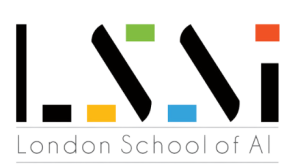Data Scientist
Career Path program

New Session Starting:
1st of Dec 2023.
Program Duration: 10
months.
4-8 hrs/week.
Learning Format:
On-site Classes.
Course Overview
Key Elements:
- 8X more interaction in on-site classes led by industry professionals.
- 7 modules and 1 final ending project.
- A comprehensive blended learning programme.
Relevant Courses
Learning Path
Introduction to Data Science
Data collection, cleaning, and preprocessing techniques
Machine Learning fundamentals
Predictive modeling for better experience
Evaluation and optimisation of machine learning models
Techniques for working with big data and distributed computing
Data Visualisation and Communication
Learning Path
Introduction to Full-Stack Development - MERN Stack
Getting started with full-stack development with the introduction of the course, and exploring course modules in detail.
Develop interactive Front-End with React
Learn all the basic and advanced concepts of front-end development including the major front-end development platforms like HTML, CSS, Javascript, and React.js Frameworks.
Fully functional Back-End with RESTFul and MongoDB
Learn all the basic and advanced concepts of back-end development including the major back-end development platforms like Node.js, Databases, RESTFul API and MongoDB.
Full-Stack Development - Merging Front-End and Back-End
Now, you will move towards the integration of the front-end and back-end and scaling them to make your website interactive and user-friendly.
Final Project: Predicting Customer Churn for a Telecom Company
Data Scientist Certification Advantage
With this programme, you will:
- Learn fundamental concepts of data science from recognised experts in the field, with information relevant to the industry.
- Implement the concepts of data science in a project and utilise its properties.
- Earn a course completion diploma that is recognised by the industry.

Skills Covered
- Data visualisation.
- Machine Learning.
- Data Evaluation.
- Data Optimisation.
- Predictive Modelling.
Tools Covered





Industry Trends
Data Scientist
Industry Growth
40% Annual Growth
For the field of Data Scientist jobs, there is a promising outlook from 2022 to 2031
1 Million New Jobs
According to NASSCOM, the number of data scientist profiles is projected to witness substantial growth by 2022
Data Scientist
Annual Salary
Our Requirements
- Strong Foundation in Mathematics and Statistics.
- Proficiency in a Programming Language (such as Python or R).
- Familiarity with Data Manipulation and Analysis.
- Knowledge of Machine Learning Concepts.
- Domain Knowledge (relevant to the organisation’s industry).



